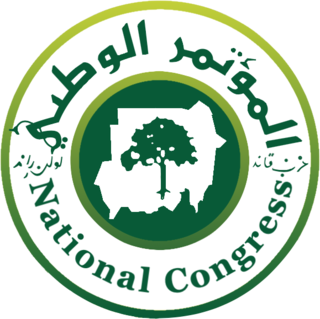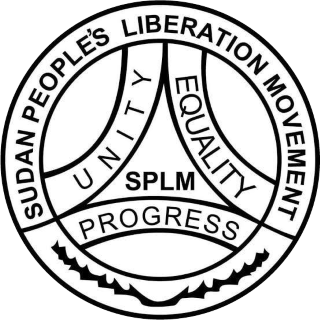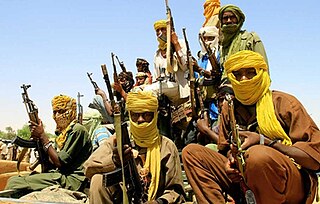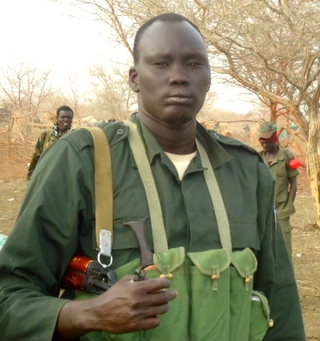Related Research Articles

Currently, the politics of Sudan takes place in the framework of a federal provisional government. Previously, a president was head of state, head of government, and commander-in-chief of the Sudanese Armed Forces in a de jure multi-party system. Legislative power was officially vested in both the government and in the two chambers, the National Assembly (lower) and the Council of States (higher), of the bicameral National Legislature. The judiciary is independent and obtained by the Constitutional Court. However, following a deadly civil war and the still ongoing genocide in Darfur, Sudan was widely recognized as a totalitarian state where all effective political power was held by President Omar al-Bashir and his National Congress Party (NCP). However, al-Bashir and the NCP were ousted in a military coup which occurred on April 11, 2019. The government of Sudan was then led by the Transitional Military Council or TMC. On 20 August 2019, the TMC dissolved giving its authority over to the Sovereignty Council of Sudan, who were planned to govern for 39 months until 2022, in the process of transitioning to democracy. However, the Sovereignty Council and the Sudanese government were dissolved in October 2021.

Below is a list of the 18 states of the Sudan. Prior to 9 July 2011, the Republic of the Sudan was composed of 25 states. The ten southern states now form part of the independent country of South Sudan. Two additional states were created in 2012 within the Darfur region, and one in 2013 in Kordofan, bringing the total to 18.

The Justice and Equality Movement is an opposition group in Sudan founded by Khalil Ibrahim. Gibril Ibrahim has led the group since January 2012 after the death of Khalil, his brother, in December 2011. The JEM supported the removal of President of Sudan, Omar al-Bashir and nation-wide government reform.

The National Congress Party was a major political party of ousted President Omar Al-Bashir, it dominated domestic politics in Sudan from its foundation until it was dissolved following the Sudanese Revolution.

Salva Kiir Mayardit, also known as Salva Kiir, is a South Sudanese politician who has been the President of South Sudan since its independence on 9 July 2011. Prior to independence, he was the President of the Government of Southern Sudan, as well as First Vice President of Sudan, from 2005 to 2011. He was named Commander-in-Chief of the Sudan People's Liberation Army (SPLA) in 2005, following the death of John Garang.

The Sudan People's Liberation Movement is a political party in South Sudan. It was initially founded as the political wing of the Sudan People's Liberation Army in 1983. On January 9, 2005 the SPLA, the SPLM and the Government of Sudan signed the Comprehensive Peace Agreement, ending the civil war. SPLM then obtained representation in the Government of Sudan, and was the main constituent of the Government of the then semi-autonomous Southern Sudan. When South Sudan became a sovereign state on 9 July 2011, SPLM became the ruling party of the new republic. SPLM branches in Sudan separated themselves from SPLM, forming the Sudan People's Liberation Movement–North. Further factionalism appeared as a result of the 2013–2014 South Sudanese Civil War, with President Salva Kiir leading the SPLM-Juba and former Vice President Riek Machar leading the Sudan People's Liberation Movement-in-Opposition.
The Government of Sudan is the federal provisional government created by the Constitution of Sudan having executive, parliamentary, and the judicial branches. Previously, a president was head of state, head of government, and commander-in-chief of the Sudanese Armed Forces in a de jure multi-party system. Legislative power was officially vested in both the government and in the two houses – the National Assembly (lower) and the Council of States (upper) – of the bicameral National Legislature. The judiciary is independent and obtained by the Constitutional Court. However, following the Second Sudanese Civil War and the still ongoing genocide in Darfur, Sudan was widely recognized as a totalitarian state where all effective political power was held by President Omar al-Bashir and his National Congress Party (NCP). However, al-Bashir and the NCP were ousted in a military coup on April 11, 2019. The government of Sudan was then led by the Transitional Military Council (TMC). On 20 August 2019, the TMC dissolved giving its authority over to the Transitional Sovereignty Council, who were planned to govern for 39 months until 2022, in the process of transitioning to democracy. However, the Sovereignty Council and the Sudanese government were dissolved in October 2021.

The Sudan People's Liberation Movement–North, or SPLM–N, is a political party and militant organisation in the Republic of the Sudan, based in the states of Blue Nile and South Kordofan. The group's armed forces are formally known as the Sudan People's Liberation Army–North or SPLA–N. In 2011 when South Sudan broke away from Sudan to form a new country, most of the Sudan People's Liberation Movement (SPLM) and Army (SPLA) left with it, leaving units remaining across the border in Sudan to form the SPLA–N.

Malik Agar is a Sudanese politician and former insurgent leader who was active in the insurgency in Blue Nile state. Since 2023, he has been the deputy chairman of the Transitional Sovereignty Council, Sudan's ruling military junta.

The Sudanese conflict in South Kordofan and Blue Nile was an armed conflict in the Sudanese states of South Kordofan and Blue Nile between the Sudanese Armed Forces (SAF) and the Sudan People's Liberation Movement–North (SPLM-N), a northern affiliate of the Sudan People's Liberation Movement (SPLM) in South Sudan. After some years of relative calm following the 2005 agreement which ended the second Sudanese civil war between the Sudanese government and SPLM rebels, fighting broke out again in the lead-up to South Sudan independence on 9 July 2011, starting in South Kordofan on 5 June and spreading to the neighboring Blue Nile state in September. SPLM-N, splitting from newly independent SPLM, took up arms against the inclusion of the two southern states in Sudan with no popular consultation and against the lack of democratic elections. The conflict is intertwined with the War in Darfur, since in November 2011 SPLM-N established a loose alliance with Darfuri rebels, called Sudan Revolutionary Front (SRF).
Ethnic violence in South Sudan has a long history among South Sudan's varied ethnic groups. South Sudan has 64 tribes with the largest being the Dinka, who constitute about 35% of the population and predominate in government. The second largest are the Nuers. Conflict is often aggravated among nomadic groups over the issue of cattle and grazing land and is part of the wider Sudanese nomadic conflicts.

James Wani Igga is a South Sudanese who was the second vice president of South Sudan. He was speaker of the National Legislative Assembly from 2011 to 2013 and secretary general of the Sudan People's Liberation Movement.

The Sudan Revolutionary Front, or the Sudanese Revolutionary Front (SRF), is an alliance between Sudanese factions that was created in opposition to the government of President Omar al-Bashir. It was declared on 12 November 2011, following several months of support by Darfuri rebel groups for the Sudan People's Liberation Movement-North in the conflict in South Kordofan and Blue Nile.

David Yau Yau is a South Sudanese politician and former militant. He served as Governor of Boma State from 2018 to 2020 and as the Chief Administrator of the Greater Pibor Administrative Area of South Sudan. He was previously the leader of a Murle insurrection against the South Sudanese government.

The South Sudanese Civil War was a multi-sided civil war in South Sudan between forces of the government and opposition forces. In December 2013, President Salva Kiir accused his former deputy Riek Machar and 10 others of attempting a coup d'état. Machar denied trying to start a coup and fled to lead the Sudan People's Liberation Movement-in-Opposition (SPLM-IO). Fighting broke out between the Sudan People's Liberation Movement (SPLM) and SPLM-IO, igniting the civil war. Ugandan troops were deployed to fight alongside the South Sudanese government. The United Nations has peacekeepers in the country as part of the United Nations Mission in South Sudan (UNMISS).

Armed clashes took in Wau State from late June 2016 to January 2019 between the Dinka-dominated Sudan People's Liberation Army (SPLA) and local opposition forces, consisting of tribal Fertit militias as well as fighters claiming allegiance to Riek Machar. It is unclear to what extent these rebels were actually part of the SPLM-IO or acting independently while using the SPLM-IO's name. The clashes resulted in the arrest of the state's governor, Elias Waya Nyipuoc, widespread death and destruction in the state capital, Wau town, and the displacement of up to 150,000 people.
This article lists events from the year 2019 in South Sudan
The Sudanese peace process consists of meetings, written agreements and actions that aim to resolve the War in Darfur, the Sudanese conflict in South Kordofan and Blue Nile, and armed conflicts in central, northern and eastern Sudan.
Events in the year 2021 in Sudan.

The Battle of Kadugli is an ongoing siege in Kaduqli, South Kordofan State, Sudan, during the current Sudanese civil war. It involves two unaligned rebel factions, the SPLM-N and the Rapid Support Forces, that are trying to capture the city from the Sudanese Armed Forces.
References
- ↑ Head of the Legislative Council of South Kordofan, Ibrahim Mohammed Balandiya, killed Archived 2012-07-08 at the Wayback Machine
- ↑ Boswell, Alan (April 29, 2011). "Vote in tense central Sudan could shape fates of 2 nations". McClatchy Newspapers. Retrieved 9 July 2012.
- ↑ Rebels kill Sudan official, 7 others in border state